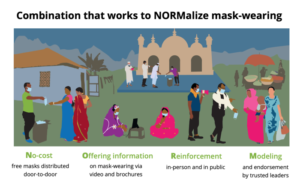This post is an update to a post from June 2021, originally titled “IPA: Evaluating and Scaling Up an Effective Strategy to Increase Mask Wearing in South Asia”.
Back in mid-2020 when the COVID-19 pandemic was beginning to sweep around the world in full force, IPA partnered with Yale Research Initiative on Innovation and Scale (Y-RISE), Stanford University Medical School, and a local Bangladesh-based organization called Green Voice to research various strategies – nearly 20 of them – to find ways to increase mask-wearing and evaluate the impact of masks on COVID-19.
The team found that a combination of encouragement strategies (now called the NORM model) substantially increased the use of community mask-wearing.
New results of the study showed that the increase in mask-wearing led to a significant reduction in the number of people with COVID-19 based on symptom reports and SARS-CoV-2 antibody tests. Twenty-nine out of every 100 people began wearing masks because of the intervention. Surgical masks were particularly effective in reducing COVID-19, preventing 1 in 3 symptomatic infections among community members 60 years and older.
The model is being scaled up to reach over 100 million people, with the potential to save many thousands of lives. However, more support is needed to effectively reach more people and further expand the model.
To donate to the scale-up efforts, please go here.
The four-part “NORM” model proved effective against COVID-19
The NORMalizing mask-wearing program is a four-part, evidence-based model that tripled correct mask-wearing in rural Bangladesh and measurably reduced community-based COVID-19. N-O-R-M stands for: No-cost free masks distribution, Offering information on mask-wearing, Reinforcement in-person and in public, and Modeling and endorsement by trusted leaders.

The research behind the model
The model was evaluated through a very large-scale randomized evaluation that included 341,830 adults in 600 villages in rural Bangladesh. The size of the sample – which had to be very large to be able to measure the impact on COVID-19 – gave the researchers the opportunity to also test a number of encouragement strategies to identify the precise combination needed to increase mask-wearing.
Results from the evaluation revealed that the NORM model more than tripled mask-wearing (from 13% to 42%) and increased physical distancing (by 5 percentage points). The impact was sustained 10 weeks into the evaluation, even after direct intervention activities ended. Reinforcement activities were particularly critical to the success of the model.
The levels of mask-wearing induced by the NORM intervention also reduced rates of COVID-19 (by 9 percent). Surgical masks were particularly effective, and distributing and promoting surgical masks to the population reduced 1 out of 3 infections in community members 60 and older. These results show that the NORM model – especially employing surgical masks – can protect the most vulnerable and potentially save many thousands of lives.
Additional details can be found in the plain language summary, press release, presentation, and academic paper.
The impact and how to help
In early April, IPA and the research team, led by Mushfiq Mobarak of Yale, began inviting policymakers, funders, and organizations based in the U.S., Europe, and Asia to small dissemination events to share these findings and explore scaling opportunities. As interest increased, IPA and partners developed an implementation toolkit, a plan for an urban adaptation, and monitoring plans to help ensure impact at scale and in new contexts.
BRAC, the largest non-governmental organization in the world, decided to scale up the model to reach 81 million people in Bangladesh. In India, the Self Employed Women’s Association (SEWA) is scaling up the approach to 3-4 million people and expects to expand to millions more. In Pakistan, the model has been scaled in the city of Lahore to reach 4 million people and in Nepal the model was launched in three municipalities.
IPA is working to rapidly expand our network and foster connections to support scale-ups. If you have connections or resources to share or can offer support yourself, please complete this Google Form. If you would like to provide financial support, you can donate here.
*This research was funded by a grant directed by GiveWell from the Center for Effective Altruism.






